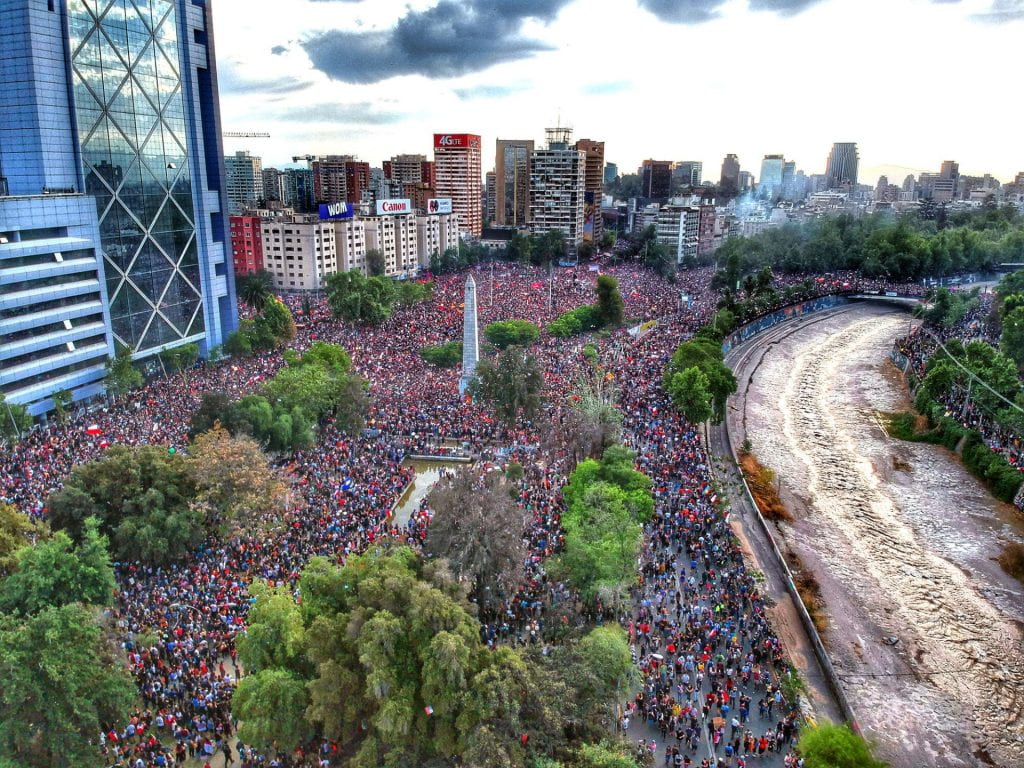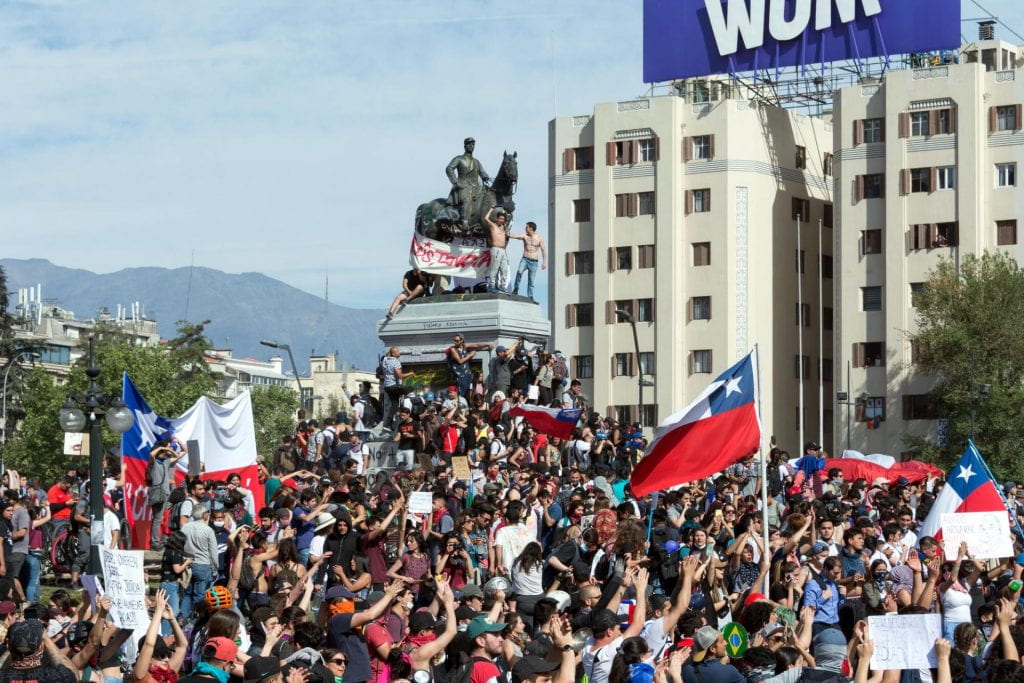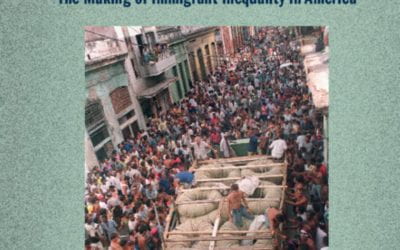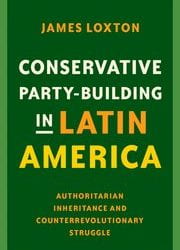The Future of the State in Chile
As I sit in my apartment in Santiago de Chile, and look at the sunset in the mountains that surround the city, I realize that the world of history and ideas has always been my home. Since March of this year, and until a few days ago (August 2020), I could only go out twice a week for three hours each time, basically to do some shopping or collect work materials from my office. The quarantine has become routine. The students are gone from Stanford’s program in Chile, and their absence, especially their voices and their steps, resonate in my walls and in my life. Missing them, and missing my friends and our traditional embraces has been an overwhelming feeling. And yet, the quiet imposed by Covid-19 has let me to meditate on my field, on the changes that are taking place in the country, and specifically on the role of the state in history as well as today.
The intensity of the events that exploded in Chile on October 18, 2019 shocked the world. Contrary to the international view of this small Southern Cone country as a model nation, massive protests took place under the banner of various social demands (better access to health benefits, free education, minimum salary and pension levels). The violence that accompanied these protests quickly escalated, bringing chaos to all major cities, but especially to the capital, Santiago. A beleaguered government was forced to make a number of concessions, including a plebiscite to decide on a new constitution. However, the violence continued, resulting in severely damaged infrastructure (particularly the underground stations), a drop in private investment, and widespread disenchantment and uncertainty. Most importantly, it raised questions about the role of the state. The state, it seems obvious, needs to find a new balance between expanded social functions and the current expectations of the market economy. Less certain is the role it should have in the future, although the recent outbreak of Covid-19 may have changed matters significantly.
In Chile, as elsewhere in Latin America, the state preceded the nation. This is a key difference with regards to the European historical experience and deserves to be explored, albeit briefly. The collapse of the Spanish empire in the early decades of the nineteenth century yielded a fragmented region with few resources to replace the old colonial administration. Paradoxically, liberalism in Spanish America, which provided the blueprint for the building of new nations after independence, launched the enormous expansion of the state apparatus. Country after country ignored the liberal tradition of a minimal state, introducing invasive policies in all areas of national life. In Chile, a somewhat moderate example in the Latin American context, the educational system, the development of infrastructure, social security benefits, including health, all developed under the aegis of the state. The trend accelerated in the twentieth century, when Chile embarked on an industrialization project that required massive state resources, including subsidies for food to keep industrial sector salaries attractive enough. Still, labor demands, the impact of the Cold War, political polarization, endemic inflation, and the massive confiscation of rural properties as well as international mining companies led to the tragic events of 1973. It was a policy of state intervention that seemed to have no end.
The regime of Augusto Pinochet (1973-1990) reversed the overall trend of state growth through the massive elimination of posts in the public sector, the privatization of most state functions (notably education, health, and pensions). It also promoted a neoliberal philosophy that emphasized individualism, competition, and the prevalence of market forces. The Constitution of 1980, which might be replaced via plebiscite by the end of the year (Covid-19 permitting), enshrined these principles and bequeathed them to the democratic governments that followed the dictatorship in 1990. Indeed, the center-left coalition that ruled for 20 years had to live with the conditions set during the transition negotiations, though in keeping with the return to the country’s moderate political traditions, it did so by introducing gradual institutional reforms.
Such compromises with the outgoing military regime were tolerated for the sake of the recovery of democracy. The economic model was maintained, in many ways under the duress of the tutelary role of the armed forces. However, favorable international circumstances helped a robust and sustained growth that averaged 5% a year for 20 years, and cut the poverty rate that afflicted nearly half of the population to less than 10% during the same period. Yet little by little, unrest developed regarding increasing inequality, corruption in business and in the armed forces. This post-dictatorial period also saw the emergence of a new generation of Chileans alien to the idea of compromise, or to the price their elders had to pay to achieve the transition to democracy. Here and there, expressions of discontent emerged from wide segments of the society, but especially among secondary and university students who ceased to believe in the promises of the political and economic model, or more practically the opportunities really available to them. The legitimacy of the restored democratic state started to fall apart. It did not happen suddenly on October 18, 2019: it was fully underway ever since a large proportion of the millennial generation started high school.

“File:Marcha Mas Grande De Chile 2019 Plaza Baquedano Drone.jpg” by Hugo Morales is licensed under CC BY-SA 4.0
The pronounced dissatisfaction of this generation has been the least visible part of the events that developed in the last few months. Observations from day-to-day life point to the breakdown of civility and the ability of the state to keep public order. For a long time, it was the internalization of the rules that compelled citizens to respect the law. The state was the enforcer, though facing increasing challenges: students and many in the larger population jumped turnstiles to evade payment of public transportation fares; rules of circulation such as right-of-way or stop signs were ignored; street light signals were increasingly violated or destroyed, part in protest, part in the interest of other motives; sidewalks became a battlefield between pedestrians and bikers, pedestrians and illegally parked motorists, and among the pedestrians themselves. As the number of accidents and fatalities grew, the state showed an inability to enforce the written rules. Gambling, especially illegal internet gambling, as well as illegal car races increased. The reluctance or unwillingness of the state to intervene encouraged further transgressions, making daily life a nightmare unseen by Chileans since the days of extreme polarization in the 70s and 80s.
As Max Weber pointed out long ago, the legitimacy of the state depends upon a belief in its legitimacy. That belief has dissipated in most of Latin America today. In Chile, in particular, all branches of government have reached an almost unthinkable record of unpopularity. It is not only the President, but also the Congress and political parties, that are stuck in single-digit percentages of approval. Citizens no longer identify with the institutions of representative democracy. On the contrary, they abhor them. What do they want, in addition to a permissive state that ditches what is perceived as a predatory economic model? Answers that have been advanced include the recognition of multiple—and changing—individual and social identities; the demand to make personal ideals and expectations the law of the land, and the rejection of anything or everything that represents the status quo. A reading of the graffiti on the walls of downtown Santiago can be illuminating about what this leaderless movement wants: in addition to unkind words about the police (Carabineros), there are calls for “everything for free,” “liberation of pets,” and “forget normalcy.” Less articulate actions have included the destruction of monuments and the burning of community centers and libraries.
This disenchantment about the “system” points to a pressing question about the future role of the state: how to both enforce the rules of public order and make them be clearly understood as fundamental to modern citizenship. As individual tempers flared, and as organized groups looted stores and destroyed city landmarks, the state risked irrelevance. And yet, at the very brink of disaster Covid-19 showed its ugly face. Protests stopped, and a sense that the state was needed made Chileans develop what Adam Smith’s defined as “sympathy”. As a result, there is at least the opportunity to recognize that life in society has dimensions beyond the political and economic: in particular, what it means to live in a community and respect the rights of others. The Chilean state in the last few decades has been more concerned about promoting economic growth than enhancing the less tangible principles of collective behavior. Hence the violence against the symbols of prosperity, and even those of Chile’s historical trajectory.

“File:Protestas en Chile 20191022 07.jpg” by Carlos Figueroa is licensed with CC BY-SA 4.0. To view a copy of this license, visit https://creativecommons.org/licenses/by-sa/4.0
The state has been indispensable and will continue to muddle through, but to survive in the long term it must adopt entirely different forms, promoting justice, public order, and shared fundamental values. Perhaps the legitimacy of the future state may reside in the Aristotelian Eudaimonia, that is, a stake in the good life of citizens, suffused with a commitment to full partnership in a political society. There might be no social life without the state, but the question about its nature and future will continue to be an important one. At the very least, it will keep us thinking about what the balance should be between the advantages and shortcomings of the current priorities of the state.
Iván Jaksic was a DRCLAS Santo Domingo Visiting Scholar in the 1990s. He returned to Chile in 2005 after 30 years of life in the United States. He is the author of several books on Latin American history and politics. Jaksic is the winner of the 2020 Chilean National History Prize.
Related Articles
A Review of Cuban Privilege: the Making of Immigrant Inequality in America by Susan Eckstein
If anyone had any doubts that Cubans were treated exceptionally well by the United States immigration and welfare authorities, relative to other immigrant groups and even relative to …
A Review of Conservative Party-Building in Latin America: Authoritarian Inheritance and Counterrevolutionary Struggle
James Loxton’s Conservative Party-Building in Latin America: Authoritarian Inheritance and Counterrevolutionary Struggle makes very important, original contributions to the study of…
Endnote – Eyes on COVID-19
Endnote A Continuing SagaIt’s not over yet. Covid (we’ll drop the -19 going forward) is still causing deaths and serious illness in Latin America and the Caribbean, as elsewhere. One out of every four Covid deaths in the world has taken place in Latin America,...




